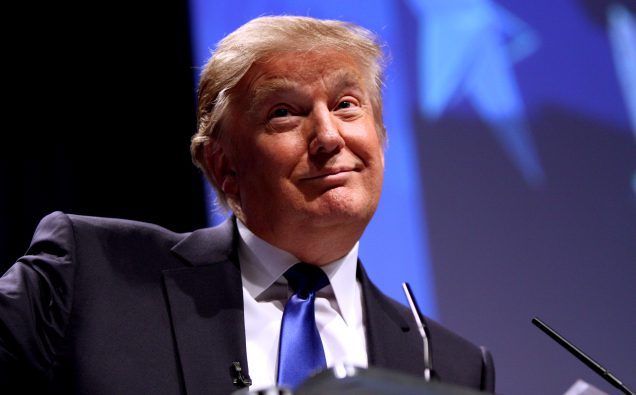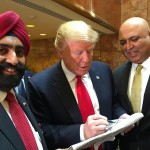
Donald Trump celebrated Tuesday’s win in Indiana and GOP primary rival Ted Cruz’s exit by challenging Democratic frontrunner Hillary Clinton, who finished behind Senator Bernie Sanders in the Midwestern state.
The billionaire businessman, who has edged out several Party candidates in the primary season, and is for all practical purposes the presumptive nominee, exulted in the “Trump Train” emerging as the sole ride for a divided Republican Party.
At the same time, Trump called for unity in the polarizing political season, when the Republican candidates launched stinging attacks against one another and even tried to malign families of their opponents.
But Tuesday evening, Trump praised Senator Cruz as a “tough competitor,” and sounded much different from his earlier flashy campaign style.
After scooping up 51 Indiana delegates (by 96 % reporting), Trump had 1053 delegates to his credit – heading toward the magic number of 1237 needed for Republican nomination.
The real estate tycoon, who is not a career politician, attacked Hillary Clinton, claiming she lacks understanding of the trade and will be a “poor president.”
Yet, some analysts and political opponents point out there are a lot of unkowns and question marks over Trump’s ability to conduct foreign policy, work on a wide array of challenges around the globe, given that the Republican frontrunner had been speaking against US allies.
The next president will need to do two things: keep our nation safe in a dangerous world and help working families get ahead here at home, John Podesta, chairman of the Hillary Clinton campaign, remarked, arguing that . “Donald Trump is not prepared to do either.”
“With so much at stake, Donald Trump is simply too big of a risk,” Podesta added.
But Trump renewed his call to “make America great again,” and said if elected he would earn back international respect for the United States and jobs for the people, which have been lost to trade deals.
Since the launch of his unconventional campaign, Trump also has drawn criticism for his controversial remarks about Muslims. In his victory speech, he did not elaborate on the issue of US relations with the Muslim world. However, he vowed, if elected, he would crush ISIS militant organization operating in civil wars of Syria and Iraq.
Lately, Trump has formed a coalition of representative from diverse American communities
Sajid Tarar, a prominent Pakistani-American businessman and member of the coalition, said Trump has climbed down from his initial rhetoric, which, he insists, were about militant minded people and not about all Muslims.
“I think American Muslims should expand their interaction with Donald Trump,” Tarar told Views and News, while voicing confidence that a Trump presidency would work for all Americans irrespective of their backgrounds.
On the Democratic side, Sanders now has 1443 delegates compared with 2217 tally of delegates (both pledged and superdelegates).
Sanders has slim prospects to upset former secretary of state in the remaining contests of the primary race but the Indiana result was more a cause of concern in terms of Hillary Clinton’s ability to drive home her campaign message with a clinching majority of Democratic voters, especially the youth.
Apart from terming trade deals like NAFTA harmful to United States, Trump has been attacking the policies of Obama Administration and politics of political correctness, something that Hillary Clinton has tried to adhere to consistently.













